- Home
- Beryl Kingston
Francesca and the Mermaid Page 4
Francesca and the Mermaid Read online
Page 4
They dined on a patio beside a well-manicured lawn at beautifully set tables under green sunshades and were waited on at the serving tables by a team of slender young men in discreet uniforms. To Francesca’s now decidedly dazzled eyes it all seemed a bit surreal.
‘It’s like a film set,’ she said to Agnes, as their plates were being filled. ‘I keep expecting Brad Pitt and Angelina Jolie to appear.’
‘He likes to do things in style,’ Agnes told her. ‘Try the asparagus.’
She tried the asparagus and the smoked salmon and caviar, and when the meal had become positively sybaritic, she ate three sweets and enjoyed every one of them.
‘This is the life!’ she said to Agnes, leaning back in her chair.
Agnes grinned. ‘Told you!’ she said.
It was past two in the morning before they finally drove home and by then Francesca was dizzy with champagne and well-being. ‘Does he often give parties?’ she asked Agnes as she turned the Fiat into the untidy drive.
‘Whenever the fit takes him,’ Agnes said, easing out of the car. ‘He’s a hospitable man. I tell you what though, he keeps you up all hours! I shall need a good lie-in tomorrow morning.’
‘You and me both,’ Francesca said.
But in fact she was awake at seven as usual and, because it was another beautiful sunny day, she got up, made herself a pot of tea and some toast in Agnes’s cluttered kitchen and went out into the garden to paint, not the mermaid this time – she’d finally stopped work on that on Thursday afternoon, having decided that she’d done all she could with it for the moment – but the mass of roses and honeysuckle that curled and entwined in intricate patterns across the front of the house. She’d started it just before they left for the party and it was pulling her powerfully. She worked as if she was mesmerized, her brush swooping across the paper with a quick controlled fluency that she’d never felt before, her imagination racing as the painting took shape. In the freedom and ease of the garden, and the growing strength of this new lifestyle, she was creating her own patterns from what she saw instead of painting slavishly from the life and the process was intoxicating. By the time Agnes finally came trailing out to join her, coffee cup in hand, the outline had been sketched and the first detailed section painted, its three artfully balanced crimson roses all voluptuous curves against the delicacy of the honeysuckle, with its tiny yellow trumpets and blue-shadowed white petals smooth as scrolls of sugar icing. It just needed a touch of alizarin on the rose thorns and the tips of the trumpets to pull it together and it would be almost right.
‘I like that,’ Agnes said, bending towards the easel.
Francesca sat back in her chair and considered. ‘Yes,’ she said. ‘I think I do too. And I never thought I’d say that about anything I’ve painted.’
‘Progress,’ Agnes approved. ‘What did I tell you?’ She settled herself at the table and put down her coffee cup. ‘Do you want to paint all day,’ she asked, ‘or are you game for a trip to town? I need to go into Lewes to replenish my stocks. I need fresh fish and meat and it’s the Saturday market today.’
It was a chance to repay her hospitality. ‘I’ll drive you there if you like.’
‘That would be handsome,’ Agnes said.
‘It’s not all altruism,’ Francesca told her. ‘I ought to start looking for a job and that would be a good place for it, wouldn’t you say.’
‘I’d say you don’t have to start job hunting yet,’ Agnes told her. ‘I’d say go on painting for a bit longer while you’re enjoying it. But I don’t suppose you’ll take any notice of that.’
‘The thing is,’ Francesca said, cleaning her brushes, ‘I can’t go on sponging on you forever. I’ll feel guilty if I don’t start paying my way. I must at least put out some feelers.’
‘Just so long as you take your time over it and don’t go rushing into something that won’t suit you,’ Agnes said. ‘That wouldn’t do at all. Let’s have a bit of brunch, shall we? I don’t know about you, but I’m starving. Could you face a fry up?’
They faced it together with a large pot of coffee and warm croissants to follow and they were idly throwing the crumbs to the birds that were waiting for titbits, when someone called them from the drive. ‘Aggie! Francesca! Where are you?’ and Henry strode round the corner of the house and came squinting towards them, shielding his eyes against the sun.
‘I’ve been beating your door down for an hour and a half,’ he told Agnes, sitting in the nearest chair. ‘I was beginning to think you’d emigrated. Or dropped exhausted after the rigours of the evening. And here you are out in the sun, making pigs of yourselves.’
‘In other words you’d like some croissants,’ Agnes said.
He gave her a grin. ‘Believe it or not, Agnes Potts, I’m not on the scrounge this time,’ he said.
She teased him. ‘No?’
‘No,’ he said. ‘I’ve come to see the mermaid. If it’s finished that is and if Francesca will let me look at it.’
‘I wouldn’t say it’s quite finished,’ Francesca said but as he was looking at her hopefully, she gentled it from her folder, explaining, ‘but then nothing I ever do is what I’d call finished. There it is, for what it’s worth.’ And she passed it across the garden table into his hand.
He examined it for several seconds, thoughtfully. Then he looked at her and smiled. ‘I’d like to buy it,’ he said.
It was such a surprise, she responded without thinking, her eyes wide. ‘Good God! Really?’
‘Well that’s refreshing,’ he said. ‘Most of my artists say How much?’
‘How many artists have you got?’ Francesca asked. The conversation was becoming as surreal as his party had been.
‘Three,’ he told her. ‘More or less.’
By this time she was so gobsmacked she didn’t know what to say. She stared across the table at him, trying to make sense of what she was hearing – and failing. She knew it was rude to stare but really she couldn’t help it. It was like being in the middle of a dream. To sit here in this rustling garden with the scent of roses making her dizzy and house martins darting in and out of her line of vision giving their high-pitched piping calls and clouds heaped and riotous above her head and to hear that he actually wanted to buy her painting had been amazing enough without being told he had a stable of artists. She’d never heard of anyone buying up artists before. Her mind was spinning so much she was feeling quite seasick. If he really did ‘have’ three artists, what he was doing with them? Perhaps he was a collector or ran an art gallery or something.
‘I’ve set her a puzzle,’ he said to Agnes with obvious satisfaction.
‘You’re a bad lot,’ Agnes rebuked him affectionately. ‘Don’t tease her.’
He stood up and handed the painting back to Francesca. ‘I tell you what we’ll do,’ he said. ‘You don’t have to make up your mind at once. You’ll need a day or two to think it over. That’s quite understood. So, let’s put first things first. Before we go any further, you’d better see what I want to do with it. I’ll call for you at half past eight on Monday morning and take you on a tour.’ And he bent to kiss Agnes on the cheek, and strode away from them, oddly stiff-backed. As the car turned out of the drive, Francesca was still struggling to think what to say.
‘Lewes,’ Agnes said. ‘We’ll leave the dishes.’
Francesca sat where she was, too stunned to move. ‘What did he mean by a tour?’ she asked. ‘A tour of what?’
‘Oh I couldn’t possibly tell you that,’ Agnes said wickedly. ‘He wants it to be a surprise.’
‘How do you know that?’
‘Body cues,’ Agnes said. ‘I’ve known him a long time. Used to work for him. He’s a great one for surprises. That’s why he throws parties because you’re never quite sure what will happen at a party. He likes the uncertainty.’
It had seemed a very well organized party to Francesca, a controlled party – if that wasn’t too strong a word. She hadn’t seen any uncertainty about it at all.
But she didn’t argue. After all, Agnes had known him a long time. That was obvious. And yet that stiff spine was a body cue too and one that seemed more like anxiety than a man who was teasing. It was all rather baffling but perhaps that was because so many unexpected things had happened in such a short time and, what with the sunshine and the roses and the house martins and the joy of painting, she was finding it hard to digest them all. Freedom rather comes at you.
‘Come and see what you think of Lewes,’ Agnes said, laughing at her bemused expression. ‘You can work things out later.’
So Francesca left her puzzles in the garden and they drove to Lewes.
Jeffrey slept late that morning, and woke with his brain muddied by poor food, too much beer and a complicated nightmare. It took him half an hour to get out of bed and then there wasn’t any coffee. Not that it would have done him any good if there had been when there were no cups to drink it from. The sooner he got Fran to see sense and come home, the better. He showered miserably, dressed in his one clean shirt and his new jeans – at least he could put on some style – bought himself coffee and croissants at Starbucks and, suitably sustained, strolled into Randall and Tongs ready to forgive his runaway lover. There was nobody there but that idiot girl, Tasha or whatever she was called, the one with the green fingernails.
‘Ah,’ he said, giving her his best smile. ‘Fran not in?’
She didn’t look up from her computer. ‘She’s gone,’ she said.
‘Gone?’ he echoed, feeling very put down. ‘What do you mean gone?’
‘Gone,’ she repeated. ‘Handed in her notice. Did you want her for something?’
‘You mean she’s got another job?’
‘No idea,’ the girl shrugged, typing on. ‘Like I said, she’s gone. Handed in her notice and went.’
He was baffled but persisted. She couldn’t just have gone. People don’t walk out of their jobs. Not in a recession. They stay where they are. ‘You mean to another branch,’ he prompted.
Tasha examined her nails. ‘Don’t think so,’ she said.
‘Think about it,’ he advised. ‘You must know where she is. She would have told you. I mean, she wouldn’t just have walked out, now would she. She must have been going somewhere.’
That provoked a response although not a very satisfactory one. ‘She did say something, now I come to think about it. In her letter. I remember Mr Randall said to file it.’ She looked up from the keyboard at last, and gazed into the corner of the room, trawling her memory. ‘She was going to nurse some relation in Sussex. Old or something. Very ill. Or that’s what she said.’
Ah! Now we’re getting somewhere. There was a letter so she’ll have left an address. ‘Whereabouts in Sussex?’
‘Don’t ask me. I’ve told you all I know.’
‘But you saw the letter.’
‘I don’t read letters,’ she told him sternly. ‘I file them.’
‘Maybe I could see it then.’
‘What?’
‘The letter,’ he said with heavy patience. The time it takes to get through to these idiot children. Don’t they teach them anything in school?
Her eyebrows arched in disbelief. ‘Oh no,’ she said. ‘Letters are private. We can’t divulge letters. Not to anyone. They’re ever so strict about it. If you want to know any more you’ll have to ask Mr Randall.’
He couldn’t do that. Randall was altogether too acute and too capable of putting two and two together.
She was typing again, frowning at the keyboard. ‘Was there anything else?’ she said.
He felt dismissed and angry. ‘No, no,’ he said, as casually as he could. ‘It’s not important.’ But he was fuming as he walked out of the shop, angry with Tasha and her asinine green nails for not telling him what he wanted to know, which she could easily have done if she’d wanted to, cross with himself for not being able to make her do as she was told and absolutely furious with Fran because this was all her fault, silly self-willed woman. How dare she walk off and not tell him where she was going! It was – he scrabbled around in his mind for a suitable word and couldn’t find one – thoughtless was too mild, stupid wouldn’t do, although it was stupid, and childish wasn’t right either. But for God’s sake, how could he find her if he didn’t know her new address. She must have left an address. Going to look after a relation in Sussex was too vague to be any good at all. He’d never heard of any relations, in Sussex or anywhere else. He’d always assumed she didn’t have any.
He checked his appearance in the nearest shop window and sighed heavily. There was nothing for it, he’d have to go traipsing over to that terrible boutique in Streatham and ask that awful old harridan of a mother of hers. He didn’t want to in the least because she’d always been hostile but if her fool of a daughter really had gone haring off to look after a relation, she was the only one who would know where she was. He’d have to be very careful how he approached her or she’d clam up and make a point of not telling him anything. She was such a dreadful woman it was hard to know the best way to handle her. Then he’d have to find a job of some kind, to tide him over until he’d set up his next deal, because his bank balance was downright unhealthy. It was all very trying. And unnecessary. And all Fran’s fault. Well I hope she’s thoroughly miserable, he thought, wherever she is. It serves her right.
Francesca was actually ridiculously happy. The sun was shining, the sky was a gorgeous blue and she was charmed with Lewes. After years growing steadily more jaded among the long Victorian streets of Beckenham with their identical houses, it was a revelation to her to walk along a short High Street in which every building was markedly different from the ones on either side of it and to look east to the edge of the town and see a green hillside rising before her. The first shop she saw when she and Agnes left the Westgate car park was so extraordinary it silenced her in mid sentence and she only just stopped herself from saying ‘Wow!’ It was labelled the Fifteenth Century Bookshop but a label was unnecessary for its antiquity was plain for every passer-by to see. The oak beams that striped its sagging frontage were faded to the colour of cafe latte, the windows were wonderfully out of alignment, squinting like drunks, and the lintel so low she had to duck her head to enter, even though she was a mere five-foot-five. And once inside she was into stunned delight, for the place was so full of books it would have taken a month to look at them all.
‘I should think they’ve got a copy of every book that’s ever been written,’ she said to Agnes, touching a rather grand edition of David Copperfield.
Agnes laughed at her. ‘If you’re going to look through the shop, we shall never get our meat,’ she said. ‘You can always come back another time. It won’t go away. It’s been here since the fifteenth century.’
So they left it, Francesca grudgingly, Agnes briskly, and walked uphill to the western edge of the town for their shopping, past the elaborately fronted rectitude of the Victorian Grammar School and a hotel called Shelley’s, until they came to a family butcher where Agnes bought liver and bacon, a sirloin of beef, a free-range chicken and a side of salmon. ‘We’ll have some of that poached for our dinner tonight.’ Then on to a greengrocer’s for oranges and lemons and a pineapple ‘to add to our soft fruit’. And then they were off again, heading for the Saturday market which turned out to be right at the other end of town.
Francesca didn’t mind how far they went or how long it took them to get there. There were things to see at every pace of the way: a house where the great Tom Paine had lived, opposite a church dedicated to St Michael, whose image flew on the wall of the twelfth-century tower, bold as brass and green with verdigris, and a bit further along the road, to her happy amazement, the entrance to a castle.
‘I feel as if I’m walking about in a fairy story,’ she said to Agnes, standing at the gate and looking in. ‘Fancy having a castle in the middle of a high street. I’ve never seen anything like that before.’
‘You saw a mermaid as I recall,’ Agnes said. ‘I’d have said a castle wa
s small beer compared to that. Come on or everything’ll be gone before we get there.’
‘I wonder whether there’s a dragon,’ Francesca said, still gazing through the gate. ‘That would be something to paint.’
‘Stick around,’ Agnes told her, ‘and I’ll take you in and show you the whole thing. But not today. Today is the Saturday market and Saturday markets get crowded.’
So they walked on down the hill, past the impressive white frontage of the County Courthouse, two splendid Georgian houses and lots of intriguing alleys, which were narrow and cobbled and lead precipitately downhill towards the open country.
I wouldn’t mind living here, Francesca thought, and wondered whether she’d have time to look in at a few estate agents and see what was on offer. But the afternoon was skimming them away. By the time they’d bought all Agnes wanted at the market – which was every bit as crowded as she’d predicted – there was only just enough time for Francesca to walk down to the station area and visit the job centre.
‘Give me the keys and I’ll wait for you in the car,’ Agnes said. ‘Just in case. We don’t want a parking ticket. Turn left at the bottom of Station Road and then left again. You can’t miss it. It’s one of those awful modern buildings like a concrete box with windows.’
Which it was and it looked decidedly off-putting after the elegance of the Georgian houses in the High Street. But there was a job to be found, so Francesca reminded herself that she was being intrepid now, straightened her spine and walked in.
The interior was much more promising, large, open-plan and warmed by strong colours, the walls painted scarlet, orange, green and yellow like an infant school and with plenty of computers standing ready to enlighten the job seekers. The only problem was that although there were quite a few vacancies, they were for van drivers and delivery drivers, carers, cleaners and caterers, and none of them were jobs that Francesca really felt she wanted to do. If push came to shove, she might have to take one of them if nothing better offered and, before she saw the mermaid and acquired a taste for freedom, she would probably have chosen one and tried to make the best of it, but now she knew she couldn’t face the idea of being a carer or a kitchen hand. I’ll wait until I know what sort of price I’m going to get for the mermaid, she decided, that might keep me going for a week or two. Then I’ll see.

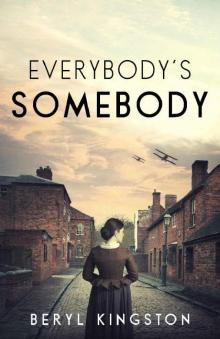 Everybody's Somebody
Everybody's Somebody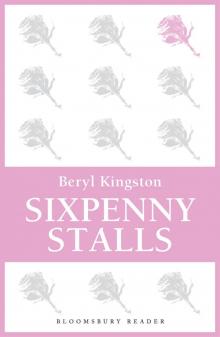 Sixpenny Stalls
Sixpenny Stalls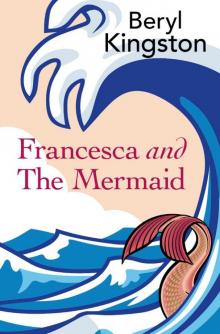 Francesca and the Mermaid
Francesca and the Mermaid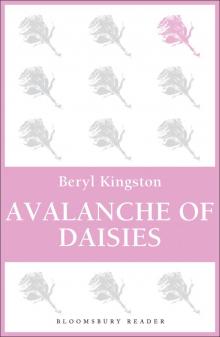 Avalanche of Daisies
Avalanche of Daisies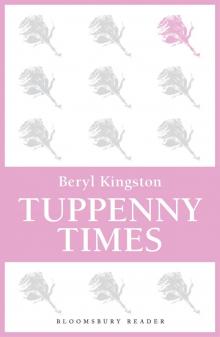 Tuppenny Times
Tuppenny Times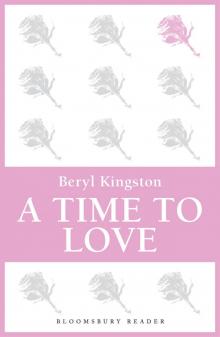 A Time to Love
A Time to Love Octavia's War
Octavia's War Gemma's Journey
Gemma's Journey London Pride
London Pride Gates of Paradise
Gates of Paradise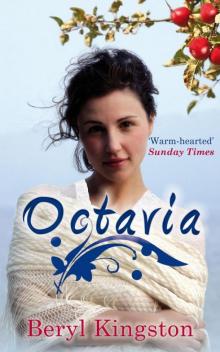 Octavia
Octavia Off the Rails
Off the Rails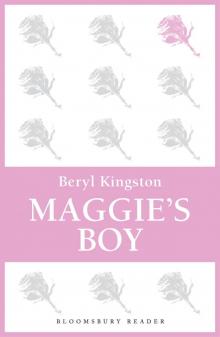 Maggie's Boy
Maggie's Boy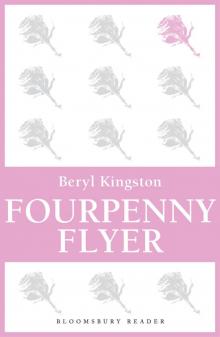 Fourpenny Flyer
Fourpenny Flyer